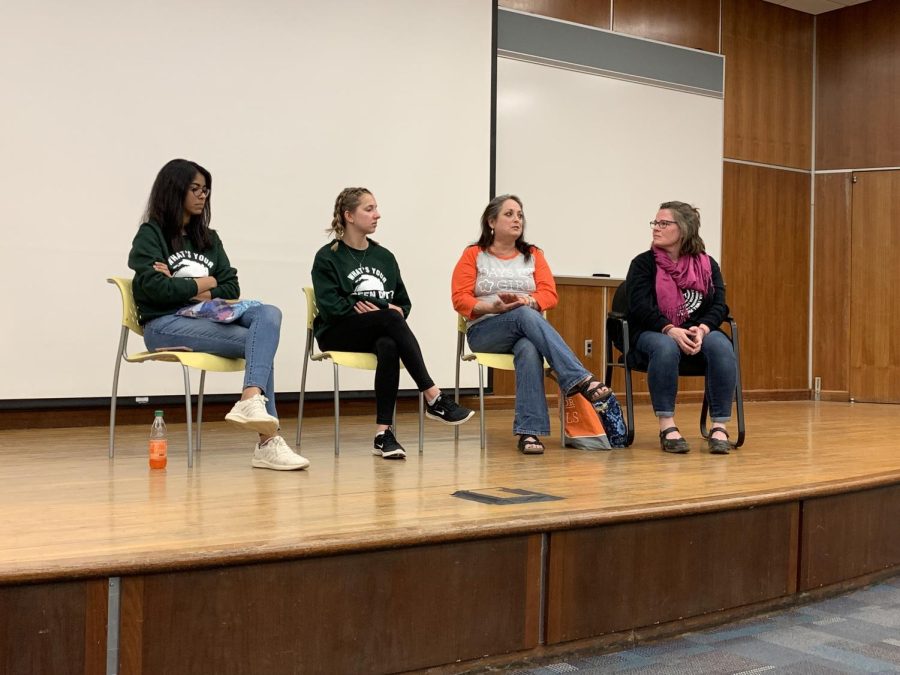USG leads discussion for menstrual accessibility
(Left to right) Ankita Tendolkar, Maddie Camp, Heidi Weisel and Cassie Pegg-Kirby on stage during the “Period. End of Sentence.” discussion.
April 17, 2019
Kent State Undergraduate Student Government (USG) held a showing of “Period. End of Sentence.” and moderated a discussion panel after the documentary in Bowman on Tuesday.
“Period. End of Sentence.” shows how women in India make their own menstrual pads that are sanitary and affordable.
Claire Weihe, the Senator for College of Public Health, and MacKenzie Michalojko, the Director of Programming for USG, put on the event to continue the conversation about USG’s The Period Project, which is an ongoing initiative to provide students free menstrual products around campus.
“I wanted to do a panel in conjunction with it so we could tie it back to Kent State because the whole documentary is about India,” Weihe said. “I want to be able to tie it back to The Period Project.”
On Wednesday, USG will present their research findings from the pilot program to the university. Weihe believes that when the university sees the numbers, they will be inclined to begin funding the initiative.
“The numbers do not lie,” Weihe said. “If they look at our numbers, they need to understand that people want them and if people will use them.”
The panel consisted of four speakers: Cassie Pegg-Kirby, the Director of the Women’s Center, Heidi Weisel, the President of Bonyo’s Kenya Mission and Clinical Experience Specialist for the College of Nursing, Maddie Camp, a junior political science major and Ankita Tendolkar, a graduate intern at the Women’s Center. All of the women are women’s health ambassadors for Days for Girls.
Days for Girls is a program that helps increase menstrual product access globally, as well as creates sustainable products for women to use. The panelists recently went to a Days for Girls conference where they made sustainable pads.
“We’re really trying to figure out how we can use (Days for Girls) as not just what it is, which is providing opportunities for young women but also to sort of inspire others,” Pegg-Kirby said. “Because it’s not just pads or these menstruation products, it’s also empowering young women who were able to stay in school.”
During the panel discussion, all the speakers emphasized the importance of accessibility, as well as having sustainable menstrual products.
“Pretty much what we use in the states is disposable,” Camp said. “I know Diva Cups are sort of becoming a thing, which is great, but we do have a crisis going on with the environment.”
Camp hopes that programs like Days for Girls can help curb the amount of disposable products used.
Ankita Tendolkar is from Mumbai, India and was a community health worker. While in that position, she realized how important it was to break the stigma of menstruation.
“One of the questions I had… was do you get your period?” Tendolkar said. “The same reaction is to shy away, keep quiet, just look down, look away… It’s not a taboo, it’s a completely natural process.”
Rachel Buck, a freshman integrated social studies major, thought the event would be a unique learning opportunity.
“I think just learning about (periods) is pretty interesting,” Buck said.
Weihe shared with the audience how she believes the university should begin to pay for these necessities.
“Our student fees with USG shouldn’t be paying for a necessity,” Weihe said. “It’s unreasonable that our student fees that should be paying for awesome things like our programming, and our allocations, are paying tampons.”
Molly Heideman is a general assignment reporter. Contact her at [email protected].












